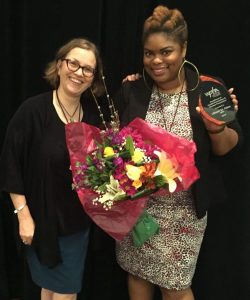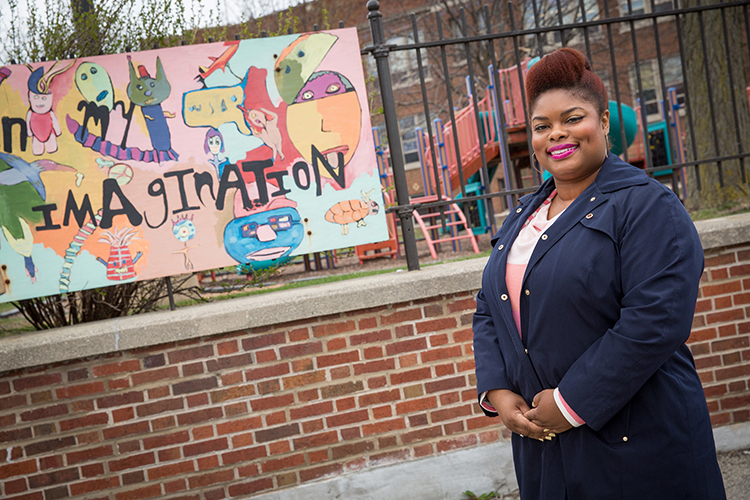Lilliann Paine is wasting no time in making a mark in public health.
Paine, one of the first two graduates of the Zilber School of Public Health, was recently honored by the Wisconsin Public Health Association for her work in health promotion and disease prevention.
And a few weeks before that, she was named a Public Health Super Hero, as part of Diversity Matters’ campaign to increase diversity in Wisconsin’s public health workforce.

The Wisconsin Public Health award was based on her work with the Lifecourse Initiative for Healthy Families, a program designed to improve birth outcomes for African Americans in Milwaukee, Racine, Kenosha and Beloit. Now she’s moving on to a different public health effort, having started a new job in June as educator and program developer with the Milwaukee County UW Extension.
Paine, who grew up on Milwaukee’s north side, is committed to working to overcome the significant health disparities affecting low income and disenfranchised communities.
“Growing up, I noticed all the health disparities,” she said in a 2013 interview shortly before her graduation. The mission statement of the UWM public health program, with its focus on social justice and the environment, attracted her, she added.
Her undergraduate work was in psychology, but she chose to pursue public health because she felt that a “focus on modifying behavior alone ignores the social determinants of health behaviors. Where we are born, grow, live, work and age contributes to health outcomes.”
The WPHA award cited her efforts in women’s and family health promotion, and in health equity and social justice promotion. Bonnie Halvorsen, outreach director for the Institute for Urban Agriculture and Nutrition who worked with Paine at the Zilber School, nominated her.
“From the first conversation I had with Lilliann, it was clear that she was about to be a change-maker in Milwaukee,” Halvorsen said. “She absolutely embodies Gandhi’s sentiment: Be the change you want to see the world. She is the change. Her courage and strength inspire the rest of us to do the same.”
One factor in her nomination was her work in building coalitions and educating others about the impact of race and racism on maternal health and infant mortality, through often difficult and challenging discussions.
“Those were courageous conversations that we were involved in,” Paine said.
As an example of the need for this type of education and shared understanding, she cites an effort to encourage teens and young women in the Medicaid program to use the long-acting reversible contraceptive IUD to reduce unwanted pregnancies.
Using the IUD involves an outpatient procedure, but women of color, who make up a significant portion of Medicaid recipients, may have difficulty getting coverage for the outpatient procedure or don’t have a regular healthcare provider, Paine said.
“You would have to have a medical home — a provider you can trust and feel comfortable with having these conversations.”
Added to that, she said, are longstanding concerns in communities of color about being used as experimental subjects in reproductive research.
“So if a program doesn’t look at the historical context of family planning, people might think that healthcare agencies and health-related initiatives are unintentionally promoting sterilization again…that providers think they know what’s best for ‘high-risk populations’ and essentially are disregarding patients’ reproductive rights.”
Paine has taken part in leadership training through a number of organizations, including the YWCA’s Unlearning Racism Workshop, the CoreAlign: Speaking Race to Power Fellowship and others. With that background, she has worked with others in the field on improving public health outreach while addressing issues of race and privilege.
“Statistically speaking, Wisconsin is the worst state to raise an African American child, and we need a generation of leaders who are not afraid of addressing concepts of power, privilege, whiteness and how that plays out in our collective work,” Paine said.
As a pioneering graduate of the Zilber School, a member of the alumni chapter and an African American woman, she is trying to reach out to other minorities to consider a career in public health.
“Milwaukee’s my home, and I’m part of the first class for the Joseph J. Zilber School of Public Health,” Paine said. “It’s important that there not just be the promotion of inclusion and diversity. We need to take action and increase opportunities in communities of color so they can bring that perspective, that lens to public health.”








